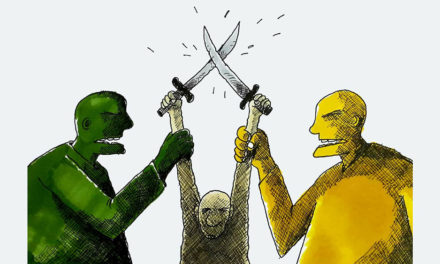The Popular Mobilization Forces (PMF) command announced on May 4, that ten of its fighters were killed in Da’ish attacks south of Tikrit. Although the PMF managed to thwart several other attacks from various parts in the suburbs of Samarra, the terrorist attacks came from five different directions: Balad, Mukaishifiya, Al-Dour, Tal Al-Dahab, and south of Tikrit, all within the Salahuddin area of operations.
The re-emergence of Da’ish follows a series of significant events in Iraq, including the withdrawal of coalition forces from three out of eight Iraqi military bases: Qaim, Qayyarah and Kirkuk. The COVID-19 pandemic, the absence of a stable government, low oil prices and their impact on the economic situation, are all factors that have contributed towards making the security situation fragile, especially in Iraq’s north-western region. Da’ish has recently carried out around 151 terrorist attacks, an indication of the growing capabilities of the terrorist group and the domestic and foreign support being provided to them.
Important questions to keep in mind are what are the factors behind the resurgence of Da’ish and what is their agenda and end goal? To answer these questions, we need to consider a couple of different issues.
The first issue is that Da’ish is exploiting the pandemic and political squabbling to expand its operations in Iraq, allowing it to resume its plans to occupy various Iraqi cities and expand its power base and sphere of influence. There have also been inordinate delays by Iraqi intelligence and security services in providing competent intelligence about Da’ish movements and in curtailing their operations in several provinces which include Salahuddin, Kirkuk and Anbar. These failures have been compounded by the various domestic crises, as well as the weakness of the federal government in the face of the COVID-19 pandemic and the collapse of oil revenues. Da’ish is now regrouping and trying to make up for its past defeats in Iraq by carrying out dramatic operations in order to create an atmosphere of fear and insecurity, in tandem with spreading fake news to exaggerate the extent of their presence and influence in the region.
The second issue is related to the potential concerns and misgivings of certain countries in the region regarding the policies and political agenda of newly sworn-in Prime Minister Mustafa Al-Kadhimi. If his government fails to prioritize the demands and interests of these regional countries in its forthcoming programme, it will face a backlash in the form of no regional co-operation and both political and security sabotage. As evidence of this, the majority of Da’ish terrorist operatives who participated in the recent attacks entered Iraq from Syria.
The assumptions underlying the second issue are based on the security concerns of some of Iraq’s neighbours and certain other countries in the region, which led them to provide logistical support and other forms of aid to Da’ish for the recent attacks in Iraq. These events, not surprisingly, come after numerous voices raised over the past few months calling for the withdrawal of U.S. forces from Iraq. Notwithstanding and despite the decision by Iraq’s parliament demanding the withdrawal of U.S. and other foreign forces from the country, Washington continues to insist that its forces remain in Iraq. Furthermore, it has been pursuing various military tactics and working hard to increase its operations with the Iraqi government.
Another matter that likely had an impact was the dismissal of Staff Lieutenant General Abdul-Wahab Al-Sa’adi, commander of the Counter Terrorism Service; a decision that was taken during the tenure of former Prime Minister Adil Abd Al-Mahdi, which was unsound and also reflected a mélange of ill-thought out and incoherent administrative and military decisions, at a time when the war against Da’ish was still raging. Al-Sa’adi commanded the forces that fought the most difficult and fiercest battles against Da’ish from Anbar all the way to Salahuddin, Mosul and Kirkuk. Sidelining one of the most potent symbols of victory against the enemy, namely Al-Sa’adi, was an unmitigated disaster that raised the enemy’s morale and damaged the people’s trust in the decisions of the former Commander-in-Chief.
On the whole, according to information provided by security experts and based on the current situation in the region, each and every issue can be analyzed and understood in terms that recent Da’ish operations in Iraq were perfectly executed and timed to take advantage of the Iraqi government’s slumbering state. Hence, expediting the new government’s work, building a national consensus and producing goodwill through the vigilance of both the Iraqi government and people, are by far the most important measures needed to prevent foreign interference and halt the operations by terrorist groups in Iraq.

Hayder Al-Khafaji
Hayder Al-Khafaji is a researcher on Middle Eastern affairs with a specialist focus on Iraq-Iran relations. He holds a postgraduate certificate in Islamic Studies from Birkbeck College, University of London, and a master’s degree from Middlesex University where he is currently completing a Professional Doctorate in Muslim cultures.










